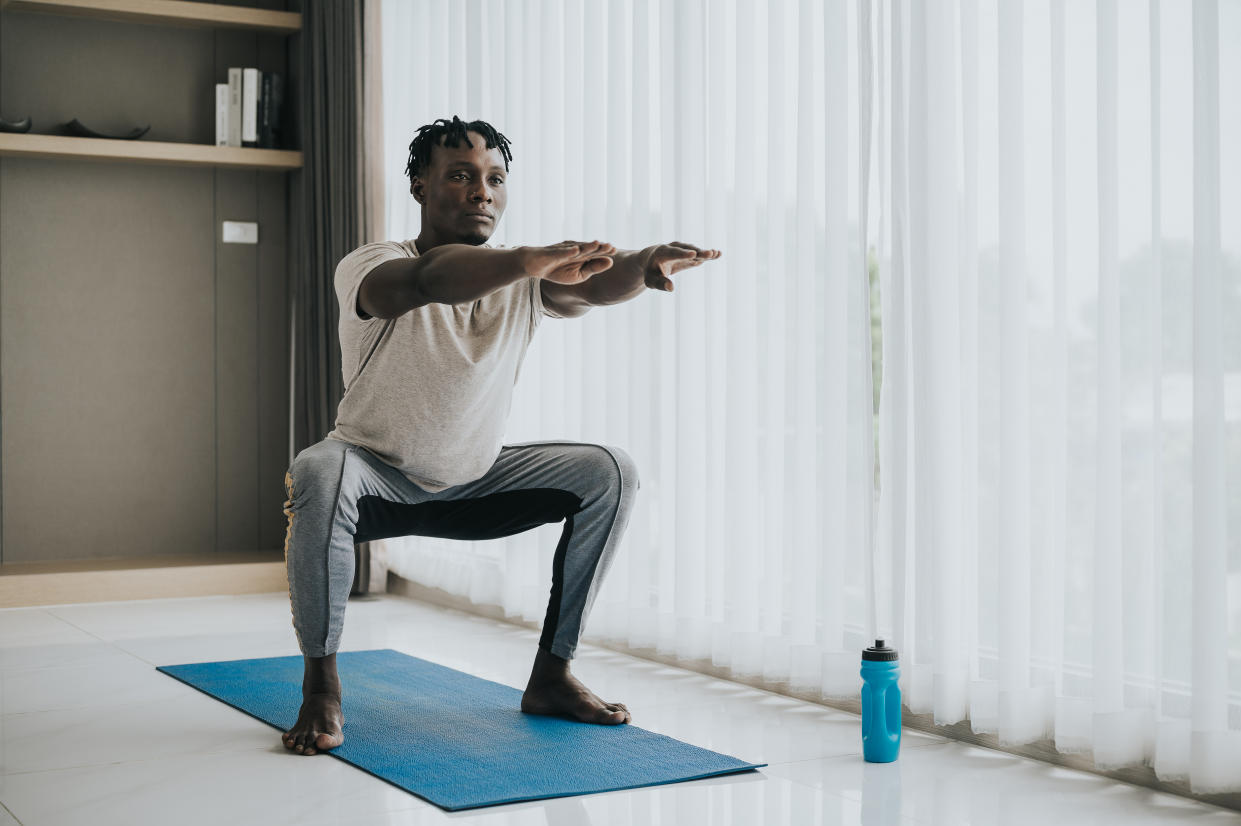4 things we learned this week to improve your health

There’s an overwhelming amount of health news out there — but it's not always easy to incorporate it into your daily life. Here, we've broken down the latest health headlines and showed you how you can use the news in order to stay healthy and thriving. Here's what to know.
SQUAT…for a brain boost
Studies have shown that spending too much time sitting — as many of us have to do for our jobs — can lead to a reduction in cognitive function. However, there may be a simple way to combat that: squatting.
A new study published in the Journal of Applied Physiology found that one minute of squatting exercises that interrupted long periods of sitting may help preserve the brain’s cognitive and executive function. The study found that young adult participants more quickly responded to mental exercises after doing the physical activity as opposed to the control group, who did not do any squatting.
While the research team asked participants not to fidget in between their squatting — something that probably won’t happen at, say, your average office job — the researchers wrote that they believe that their squat intervention “may be able to be used by individuals seeking to break up their sedentary behavior in an effort to preserve cognition during times, such as in the workplace.”
Increased cognitive function isn’t the only reason to break up long periods of sitting. Research has previously shown that too much time sitting down can increase risk of heart disease, vascular problems, cancer, weight gain and lower back and spine issues. Yet you don’t have to squat, exclusively, in order to break up your time sitting: a recent study found that any kind of activity is better for you than sitting down and that shorter “activity snacks” can be beneficial when compared with a longer daily workout. In practice, that may mean taking a quick walk around the block while on a phone call — anything to get your butt out of the seat.
AVOID…pre-cut cantaloupe
The Centers for Disease Control and Prevention (CDC) warned people not to eat pre-cut cantaloupe of unknown origin, due to a recent deadly salmonella outbreak linked to the fruit. Salmonella, which is a group of bacteria that typically causes gastrointestinal issues like diarrhea and stomach cramps, can also cause severe illness, especially in people with compromised immune systems.
If you do find yourself ill and suspect salmonella may be to blame, drink plenty of fluids and rest at home. More intense symptoms, such as a high fever and blood on your urine, warrant a visit to your doctor.
EAT…more plants
Stanford Medicine researchers found evidence to suggest that a plant-based vegan diet may be even more beneficial to one’s well-being than a healthy omnivore diet. In a randomized clinical trial of 22 healthy, adult, identical twin pairs, those consuming a healthy vegan diet improved several health markers, including their fasting insulin level and lower low-density lipoprotein cholesterol (LDL-C) levels, sometimes referred to as “bad cholesterol.”
According to Stanford University professor of medicine Christopher Gardner, who is the senior author of the study, the biggest benefit of eating the vegan diet was that the participants increased their fiber intake and lowered their saturated fat consumption, which can improve cardiometabolic health.
While avoiding animal products may be a step in the right direction for your health, it still matters what you replace those foods with. Eating a variety of vegetables, fruits, nuts and seeds will allow you to get gut-healthy fiber, while also widening your range of vitamins and minerals.
If you’re interested in exploring a plant-based diet, January is a good time to start. Many people participate in the “Veganuary” challenge, which encourages individuals to go entirely plant-based for the first month of the year (and beyond, if they’re interested!)
DON’T…make big decisions after a lack of sleep
New research from the University of Ottawa, published in the journal Psychophysiology, found that all-nighters — in which you go 24 hours or more without sleep — can significantly impact your ability to make smart decisions, as the lack of sleep dampened neural responses to the outcomes of their choices. After a sleepless night, people were less likely to feel good about positive outcomes, and more likely to feel neutral about bad outcomes, per the study, which looked at the impact of one night of total sleep deprivation on 56 healthy adults.
Anyone who has tossed and turned throughout the night knows that a lack of sleep can affect your mood, but it can also exacerbate the symptoms of many mental conditions including depression, anxiety and bipolar disorder. There’s also plenty of reasons to prioritize sleep from a physical standpoint: Not getting enough shut eye increases the risk of diabetes, cardiovascular disease and cancer, according to the American Academy of Sleep Medicine.
The CDC recommends at least seven hours of sleep for adults 18 to 60 — which, of course, can be easier said than done. If you struggle with sleep, there are certain research-backed things that you can do to increase your chances of getting a solid night of rest, including creating a winddown routine, avoiding screens, sticking to a consistent sleep schedule and maintaining an optimal sleep temperature of between 68 and 72 degrees.


